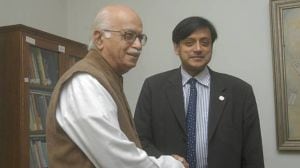Clinton wants to explore North Korea missile offer
OKINAWA, JULY 22: US President Bill Clinton said Saturday he did not fully understand North Korea's offer to end its ballistic missile pro...

OKINAWA, JULY 22: US President Bill Clinton said Saturday he did not fully understand North Korea’s offer to end its ballistic missile programme in return for help on space exploration, but wanted to pursue the idea.
"It’s not clear to me what the offer is and what is being requested in return for it," Clinton told reporters after a meeting with Japanese Prime Minister Yoshiro Mori. "I think it is something that needs to be explored."
In landmark talks with Russian President Vladimir Putin in Pyongyang earlier this week, North Korea’s enigmatic leader Kim Jong-il offered to end Pyongyang’s missile programme if given help in its quest to explore space.
North Korea’s ballistic missile programme has been of acute concern to the West since 1998, when it test-fired a missile over Japan. Pyongyang said the rocket was a space shot to put a satellite in orbit but the claim was widely dismissed abroad.
North Korea has since declared a moratorium on such tests but, despite this, Western officials worry that it may continue to develop its missile systems.
US intelligence estimates suggest Pyongyang may be able to strike US territory by 2005, prompting a US proposal to develop a missile defence shield that is strongly opposed by Russia, China and others who fear it will spark an arms race.
Clinton, who held talks with Putin on Friday night, ahead of the annual Group of Eight (G8) summit, said the Russian leader had provided enough information about the Pyongyang offer that he felt it should be looked into further.
"I think we heard enough so that there should be an attempt to determine what the facts are here, but I can’t say that I’m clear enough on what the offer was to make a final judgment," Clinton said. "We need to see exactly what the specifics are,"
Kim’s meeting with Putin was one of the latest in a string of efforts by North Korea, including the landmark June 13-15 summit between the leaders of the two Koreas in Pyongyang, to end the self-imposed isolation of his famine-stricken, totalitarian regime.
In the newest development, South Korea said on Saturday that the North had accepted a Seoul proposal for high level talks in a follow-up to last month’s summit and wants to have them by the end of July.
US officials planned to meet Russian officials on Saturday on the sidelines of the summit of leading industrial nations and Russia on this southern Japanese island to get a better grasp of just what North Korea may have had in mind in the missile proposal to Putin.
A US official said Washington also hoped North Korea would elaborate on the offer in its next round of missile talks with the United States. Those have yet to be scheduled, but Washington hopes they will take place in the next few weeks.
"We hope that North Korea will take advantage of our bilateral missile talks to explore this," Jim Steinberg, the deputy US national security adviser, told reporters, saying North Korea dominated Clinton’s and Mori’s 45-minute meeting.
"What we don’t know is whether they’re proposing, in effect, to use the space launch services of other countries," he said. "That’s something we think is well worth exploring.
"Or are they asking that others who have that capability, in effect, give them space boosters to use themselves, which we would have concerns about because it would give them access to the technology," Steinberg added.
The United States has insisted it is willing to look into the idea if North Korea abandoned its missile programme entirely and if the help it sought was in the form of rocket launches by other countries outside its territory.
The G8 praised North Korea for freezing ballistic missile tests but urged the reclusive Stalinist state to go further to address concerns over weapons proliferation and human rights.
In a statement released at the end of the first day of the summit, the G8 warmly welcomed last month’s historic summit between the Presidents of the two Koreas, which have been separated for half a century and are still technically at war.
"We fully support the positive developments set in train by the meeting, and encourage the South-North dialogue to continue and advance further," the G8 said in a statement.
The G8 comprises the United States, Russia, Japan, Germany, Britain, France, Italy and Canada.



- 01
- 02
- 03
- 04
- 05




























